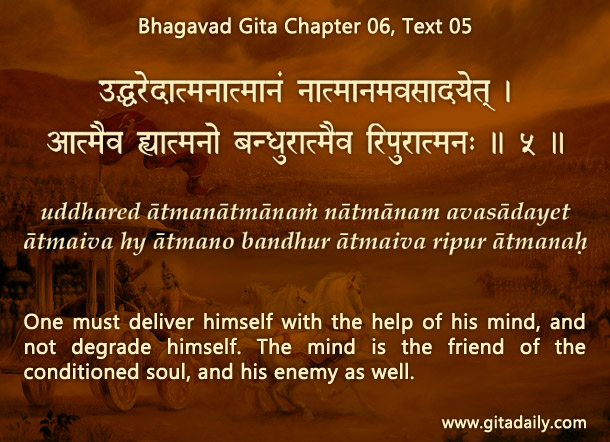We may want to become mindful, but may not know clearly how to do so. Here are three tangible steps that we all can adopt according to our capacity:
Become aware of our actions: One way to achieve such awareness is to cultivate the habit of becoming observers of ourselves. To that end, especially empowering is the Gita insight that we are spiritual beings distinct from our physical bodies. In fact, the Bhagavad-gita urges us to look at ourselves from the perspective of a non-attached observer (14.23).
Become aware of our intentions: When we become aware that our actions are not aligned with our intentions, this awareness prompts introspection. We examine our intentions to assess how sound and strong they actually are. Thus, we learn to distinguish between the nominal intentions we merely mouth and the serious intentions we truly treasure.
Constructively bridge the gap between our actions and intentions: We can bridge this gap in two ways: first, by aligning our externals with our internals; second, by aligning our internals with our externals. Let’s consider the first scenario. On those occasions when we recognize that our actions are neither beneficial nor even enjoyable, we may decide to let go of them. For example, while watching TV, we may mindlessly consume fast food without even tasting or enjoying it, let alone considering the calories we consume or the impact of such consumption on our weight and health. If we just pause briefly, we will become more self-aware, which can prompt us to stop eating or at least turn toward healthier food.
Let’s consider the second scenario, wherein we align our internals with our externals. Suppose we intended to rush from one part of the city to another. But along the way, we noticed a peaceful and colorful park that we were largely overlooking due to our haste. On contemplating briefly, we may recognize that our next engagement is not so important or urgent as to forbid us from investing a few moments to savor the park’s serenity and beauty.
Urging us to become mindful, the Gita (06.05) recommends choosing a prudent course of action that helps us avoid self-degradation and attain positive self-transformation.
Summary:
Mindfulness helps us become aware of what we are actually doing, contemplate what we actually want to be doing, and constructively bridge the gap between the two.
Think it over:
- How can we become more aware of our actions?
- How can we become more aware of our intentions?
- How can we bridge the gap between the two?
Audio explanation of the article is here: https://gitadaily.substack.com/p/three-steps-to-mindfulness
***
06.05: One must deliver himself with the help of his mind, and not degrade himself. The mind is the friend of the conditioned soul, and his enemy as well.
To know more about this verse, please click on the image


Hare Krsna. Thank you. 🙏
Happy to be of service